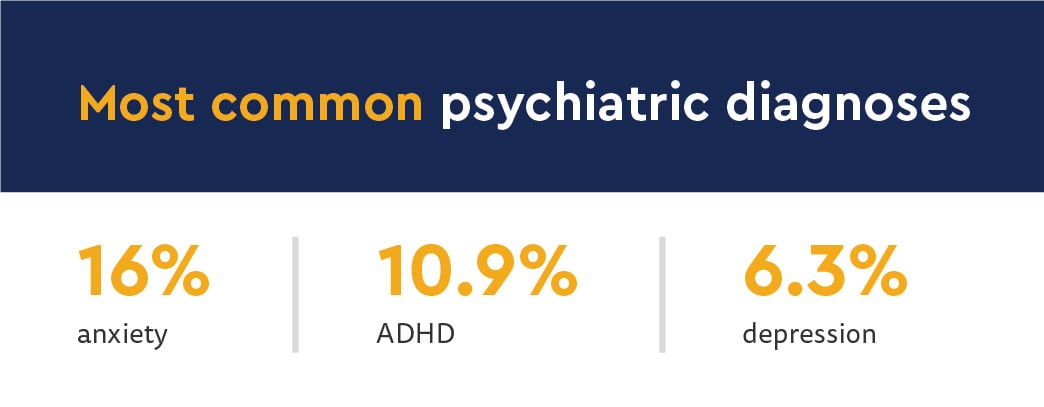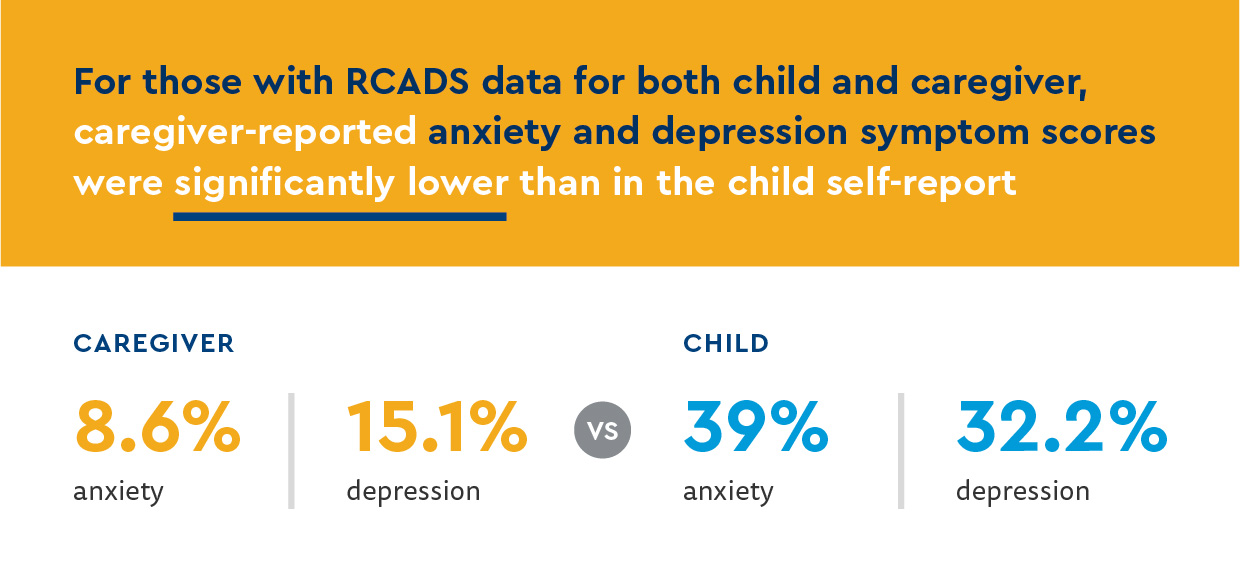Key takeaways
-
Our researchers are the first to study anxiety and depression in pediatric CD using a well-established, valid child and caregiver measure.
-
Caregivers endorsed more concerns for their child’s depression over concerns for anxiety, yet overall, more than half of the caregivers denied both anxiety and depression symptom concerns despite the child participants reporting concerns.
-
Children with CD should be regularly screened for mental health concerns using well-established, validated tools.
Approximately 3% of children are affected by celiac disease. A gluten-free diet is the only treatment for this common autoimmune disorder.
When compared to healthy cohorts, recent studies found children with celiac disease have greater levels of clinically significant psychological distress, including anxiety and depression. Studies also found poorer adherence to the gluten-free diet is associated with severe psychological distress.
Researchers from the multidisciplinary Colorado Center for Celiac Disease at Children's Hospital Colorado were the first to conduct a large, cross-sectional study to:
- Evaluate mental health conditions in pediatric celiac disease using validated child- and caregiver-proxy reports
- Explore differences in reports due to:
- Age (child vs. adolescent)
- Respondent (caregiver vs. child)
- Comorbidities (medical and psychiatric)
- Duration of gluten-free diet
Methods: data collected from pediatric patients, caregivers and medical records

Inclusion criteria
- Speaks English
- Celiac disease confirmed by biopsy (modified Marsh score ≥2)
- Following a gluten-free diet
Via a questionnaire at a follow-up visit with the Center, the caregiver provided:
- Child's race/ethnicity
- Medical and psychiatric comorbidities
- Residence zip code
Study authors queried participant medical records for additional information, including:
- Caregiver marital status
- Household income
- Median years since diagnosis
- Family history of celiac disease
- Visit(s) with the Center’s psychologist
- Tissue transglutaminase lab value at time of study
Child participants and their caregiver completed the Revised Child Anxiety and Depression Scale (RCADS) during a clinic visit:
- 175 parents/caregivers
- 152 children
This cross-sectional study categorized patients in two age groups for comparison:
- 8 to 12 years
- 13 to 18 years
Anxiety and depression instrument and data analysis
RCADS evaluates risk for depression and anxiety in 8- to 18-year-olds using 47 questions, with self-report and parent-report versions. The study authors used the major depression index and the total anxiety score to estimate levels of depression and anxiety symptomatology, respectively.
- Per RCADS scoring guidelines, T scores based on gender and an estimated academic grade level by age
- T scores ≥65 considered "elevated" and <65 “normal”
- P value <0.05 considered statistically significant
Results: child self-report and caregiver proxy-report findings for anxiety and depression
Study population characteristics
Of the 175 pediatric participants:
- Median age: 11.7 years (SD=2.7)
- 67% female
- 54.9% symptomatic after gluten exposures
Results from caregiver report:
- 38.9% of child participants had at least one comorbid medical diagnosis
- Most common comorbidities
- 18.9% atopic disease
- 10.9% endocrine disorders
- 24% of child participants had at least one known psychiatric diagnosis

Medical records identified:
- 46.9% of child participants had at least one additional diagnosis
- Most common comorbidities
- 13.1% atopic disease
- 10.3% endocrine disorders
- 13.1% of child participants had at least one psychiatric diagnosis
- Most common psychiatric diagnoses
- 9.1% anxiety
- 3.4% ADHD
- 2.3% depression
Anxiety and depression concerns in pediatric celiac disease
Prevalence of anxiety and depression symptoms
Caregiver report on child |
Medical chart of same children |
|
16% known anxiety diagnosis |
9.1% anxiety diagnosis |
|
6.3% known depression diagnosis |
2.3% depression diagnosis |
Prevalence of clinically elevated anxiety and depression symptoms (RCADS)
Child self-report |
Caregiver proxy-report |
|
32% anxiety |
6.9% anxiety |
|
32.2% depression |
14.3% depression |
Examining between-group differences
Comparing anxiety and depression symptom prevalence by child age groups
Caregiver proxy-reports:
- Prevalence of anxiety symptoms not significantly different by age group
- Younger participants had lower rates of clinically elevated depression symptoms than older participants (9.5%vs. 21.4%)
Child self-reports:
- Rates of clinically elevated anxiety and depression symptoms not significantly different by age group
Comparing caregiver and child report of anxiety and depression symptoms

Comparing reported anxiety and depression symptoms by presence or absence of medical comorbidities documented in medical chart
- Caregiver-reported RCADS scores not significantly different between anxiety and depression symptoms for children with documented medical comorbidities
- Child self-reports had significantly lower scores for anxiety and depression symptoms among those with documented medical comorbidities than children without (P = 0.04)
Comparing reported anxiety and depression symptoms by presence or absence of caregiver-reported medical comorbidities
- Caregiver-reported RCADS scores of anxiety and depression symptoms for children with medical comorbidity was not significantly different than those without
- Rates of child-reported anxiety and depression symptoms
- Anxiety (P = 0.012): 41% without comorbidity vs. 22% with
- Depression (P = 0.004): 20.8% without comorbidity vs. 42.5% with
Gluten-free diet adherence and impact on anxiety and depression symptoms
Duration of gluten-free diet was not correlated with anxiety or depression symptom scores.
Discussion: detection of mental health symptoms in pediatric celiac disease patients difficult for caregivers
This study is the first to specifically examine anxiety and depression in pediatric celiac disease using a validated screening tool and included the largest known sample of pediatric patients with celiac disease across a wide age range.
Key findings
- Pediatric participants reported high rates (39%) of anxiety and depression symptoms.
- The prevalence of anxiety and depression symptoms higher in child self-report than caregiver-report indicates that caregivers are not always able to detect mental health symptomology in their children.
- Findings suggest using validated anxiety and depression screening tools like the RCADS should be standard clinical practice for children with celiac disease.
- Comorbid pediatric celiac disease can make it more difficult for caregivers to distinguish mental health concerns from physical health.
Conclusion: regular anxiety and depression screening for pediatric celiac disease recommended
Children with celiac disease reported a high prevalence of anxiety and depression symptoms, regardless of medical or psychiatric comorbidities, while caregivers often did not endorse symptom concerns.
The study authors concluded that providers should ask both caregiver and child about psychosocial symptoms and use validated screening tools in routine assessments.
Featured Researchers

Monique Germone, PhD
Licensed clinical psychologist
Pediatric Mental Health Institute
Children’s Hospital Colorado
Associate professor
Psychiatry-Child-CHC
University of Colorado School of Medicine

Marisa Stahl, MD
Pediatric gastroenterologist
Digestive Health Institute
Children's Hospital Colorado
Assistant professor
Pediatrics-Gastroenterology, Hepatology and Nutrition
University of Colorado School of Medicine

Pooja Mehta, MD
Pediatric gastroenterologist
Digestive Health Institute
Children's Hospital Colorado
Assistant professor
Pediatrics-Gastroenterology, Hepatology and Nutrition
University of Colorado School of Medicine

Mary Shull, MD
Pediatric gastroenterologist
Digestive Health Institute
Children's Hospital Colorado
Assistant professor
Pediatrics-Gastroenterology, Hepatology and Nutrition
University of Colorado School of Medicine

Edwin Liu, MD
Director, Colorado Center for Celiac Disease
Digestive Health Institute
Children's Hospital Colorado
Professor
Pediatrics-Gastroenterology, Hepatology and Nutrition
University of Colorado School of Medicine





 720-777-0123
720-777-0123










